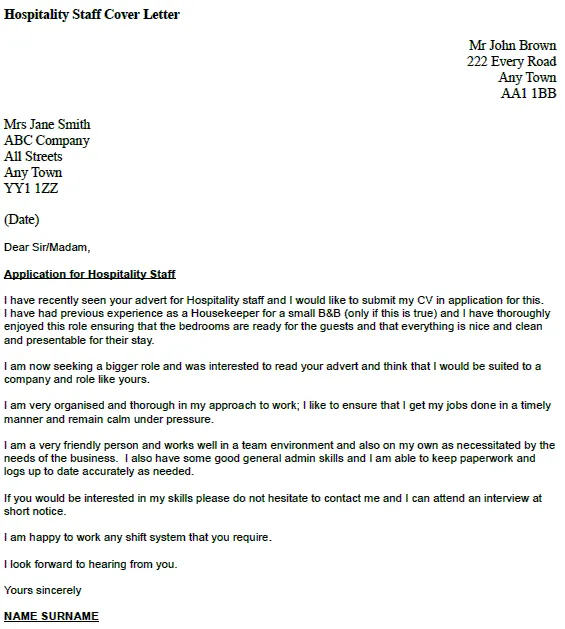What is a Hospitality Cover Letter
A hospitality cover letter is a crucial document that accompanies your resume when applying for jobs in the hospitality industry. It serves as your first introduction to a potential employer, offering a chance to highlight your relevant skills, experience, and personality. Unlike a resume, which provides a factual overview of your qualifications, a cover letter allows you to express your enthusiasm for the position and explain why you are the ideal candidate. Think of it as your personalized sales pitch, designed to capture the hiring manager’s attention and convince them to invite you for an interview. Crafting a compelling cover letter is essential for standing out in a competitive job market, especially in the diverse and dynamic world of hospitality.
Why is a Strong Hospitality Cover Letter Important
A strong cover letter can significantly increase your chances of landing a job interview in the hospitality sector. It’s your opportunity to go beyond the basic information in your resume and demonstrate your genuine interest in the specific role and company. In a field where personality and interpersonal skills are paramount, a well-written cover letter allows you to showcase your communication skills, your understanding of the industry, and your ability to connect with potential employers on a personal level. It also gives you a chance to address any gaps in your resume or explain why you are making a career change. Employers often use cover letters to assess your writing style, attention to detail, and overall professionalism. A well-crafted letter can differentiate you from other candidates, especially if you tailor it to each specific job application.
Highlighting Your Skills and Experience
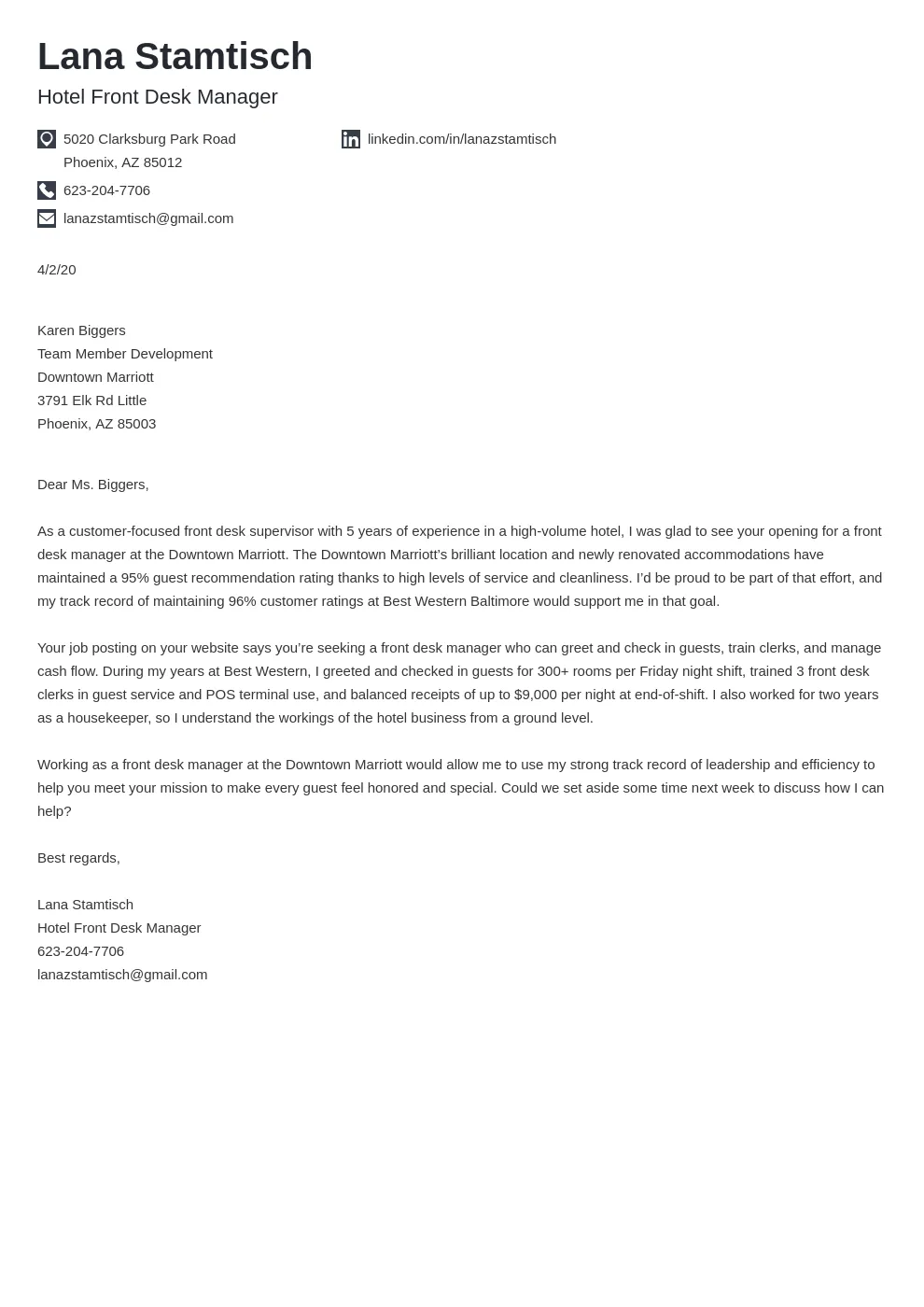
Your hospitality cover letter is where you emphasize the skills and experience most relevant to the job you’re applying for. Think of it as a targeted marketing tool. Instead of simply listing your past roles, focus on the skills that align with the job description. For example, if the job requires strong customer service skills, provide specific examples of how you’ve excelled in this area. This might include resolving customer complaints, handling difficult situations with grace, or exceeding customer expectations. Highlighting your experience is equally important. Provide a brief overview of your relevant work history, emphasizing your accomplishments and the positive impact you had on previous employers. Use action verbs to describe your responsibilities and achievements to make your experiences more impactful.
Showcasing Relevant Experience
When showcasing your experience, it’s vital to choose examples that resonate with the specific requirements of the job. If you are applying for a managerial role, provide details about your leadership skills, such as how you motivated and managed a team, improved operational efficiency, or implemented new training programs. For customer-facing positions, highlight your experience in building rapport with guests, handling complaints, and ensuring customer satisfaction. If you’re applying for a position in a specific area, such as food and beverage, highlight your knowledge of menu planning, inventory management, or bar operations. Tailoring your experiences to the job requirements demonstrates that you understand the role and that you have the skills necessary to succeed. This targeted approach significantly increases your chances of getting noticed.
Quantifying Achievements
Quantifying your achievements makes your cover letter more compelling and gives the hiring manager concrete evidence of your capabilities. Instead of simply stating that you improved customer satisfaction, quantify it by saying you increased customer satisfaction scores by 15% in six months. If you increased sales, mention the percentage or the dollar amount of the increase. If you were involved in a cost-saving initiative, specify the amount of money saved. Use numbers, percentages, and specific data points to demonstrate the impact of your work. This approach not only showcases your accomplishments but also shows that you have a results-oriented mindset. Such details can greatly influence the hiring manager’s perception of your value to the organization and shows the potential value you can bring to the company.
Formatting Your Hospitality Cover Letter
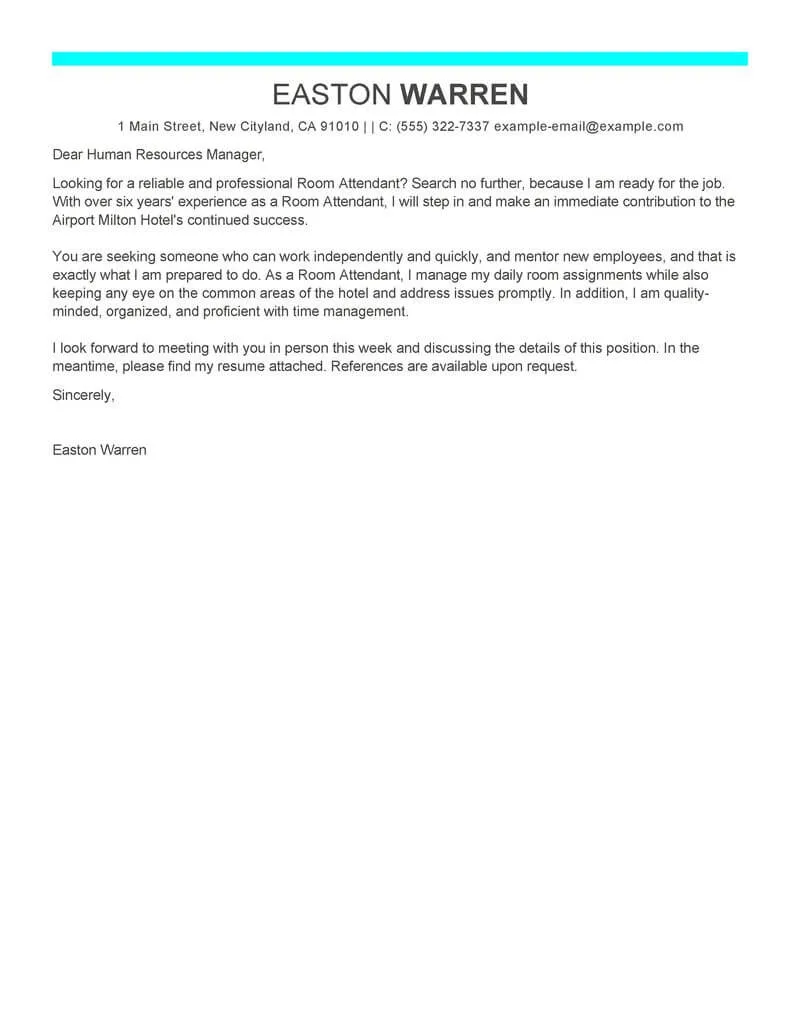
Formatting is a critical aspect of your hospitality cover letter, as it significantly impacts the first impression you make on the hiring manager. A well-formatted letter is easy to read, professional, and visually appealing, while a poorly formatted one can reflect negatively on your attention to detail and professionalism. Keep the format clean, organized, and consistent. Use a standard font like Times New Roman, Arial, or Calibri, and maintain a font size between 10 and 12 points. Use single spacing for the body of the letter and double spacing between paragraphs. Ensure the letter is neatly aligned, with consistent margins (typically one inch) on all sides. Make sure there are no spelling or grammar mistakes. Consider using bullet points to break up large blocks of text and make key information easier to scan.
Contact Information and Date
Start your hospitality cover letter with your contact information. This should include your full name, phone number, email address, and possibly your LinkedIn profile URL. Place this information at the top of the letter, typically on the left or right-hand side. Below your contact information, include the date. This shows when you wrote the letter and is a standard part of formal correspondence. If you know the hiring manager’s name and title, include their information as well. This demonstrates that you’ve taken the time to research the company and the role. When including the date, make sure to use the proper format, such as Month, Day, Year (e.g., May 15, 2024).
Greeting the Hiring Manager
Your greeting sets the tone for the entire cover letter. Whenever possible, address the hiring manager by name. This shows that you have put in the effort to personalize your application and that you are genuinely interested in the opportunity. If you can’t find the hiring manager’s name, try to find the name of the recruiter or the department head. Addressing the letter to a specific person is more effective than using generic greetings. If you are unable to find a specific name, use a professional greeting such as “Dear Hiring Manager” or “Dear [Company Name] Hiring Team.” Avoid informal greetings like “Hi” or “Hello.” Always maintain a professional and respectful tone.
Body Paragraphs
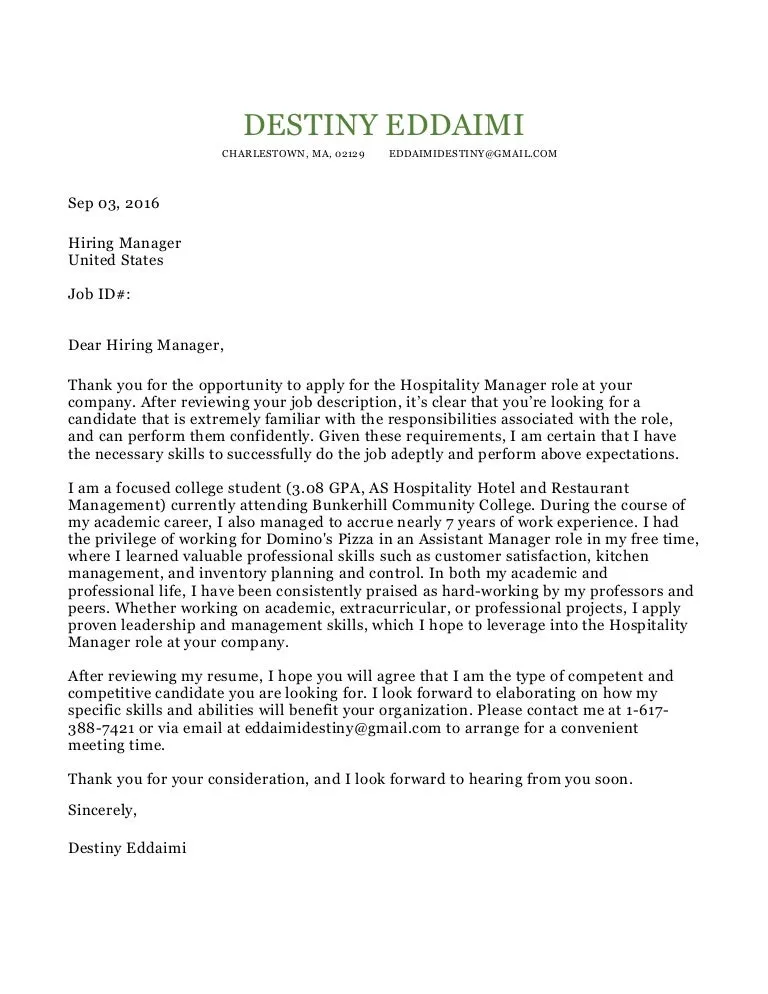
The body paragraphs are the heart of your hospitality cover letter. This is where you showcase your skills, experience, and enthusiasm for the role. Structure your body paragraphs strategically to highlight your qualifications and explain why you are a great fit for the job. Usually, the body consists of 2-3 paragraphs, each focusing on a specific aspect of your qualifications. Use clear, concise language, and avoid jargon or overly complex sentences. Tailor the content to match the job description, emphasizing the skills and experiences most relevant to the position. Provide specific examples to support your claims. These paragraphs should flow smoothly, creating a compelling narrative that captures the hiring manager’s attention and makes them want to learn more about you. Each paragraph plays a critical role in convincing the hiring manager.
The Opening Paragraph
Your opening paragraph is your first chance to make a strong impression. It should immediately grab the hiring manager’s attention and make them want to read the rest of your letter. Start by stating the position you are applying for and where you found the job posting. Then, briefly introduce yourself and express your enthusiasm for the opportunity. You can also mention a key skill or accomplishment that makes you stand out. The goal is to create an engaging introduction that piques the hiring manager’s interest. Avoid generic opening lines; instead, personalize your introduction to show your understanding of the company and the role. This will set a positive tone and help you differentiate yourself from other applicants from the very beginning.
Middle Paragraphs
The middle paragraphs of your hospitality cover letter should provide more detail about your relevant skills and experience. Choose the most important qualifications listed in the job description and use these paragraphs to demonstrate how your skills and experience align with the role’s requirements. Support your claims with specific examples and quantifiable achievements. For each skill or experience you mention, give the hiring manager a reason to believe you can succeed. Use action verbs to describe your responsibilities and achievements, and focus on results. Demonstrate your understanding of the company’s mission, values, and services. Make sure to tailor these paragraphs to the specific job requirements, as this targeted approach is essential.
The Closing Paragraph
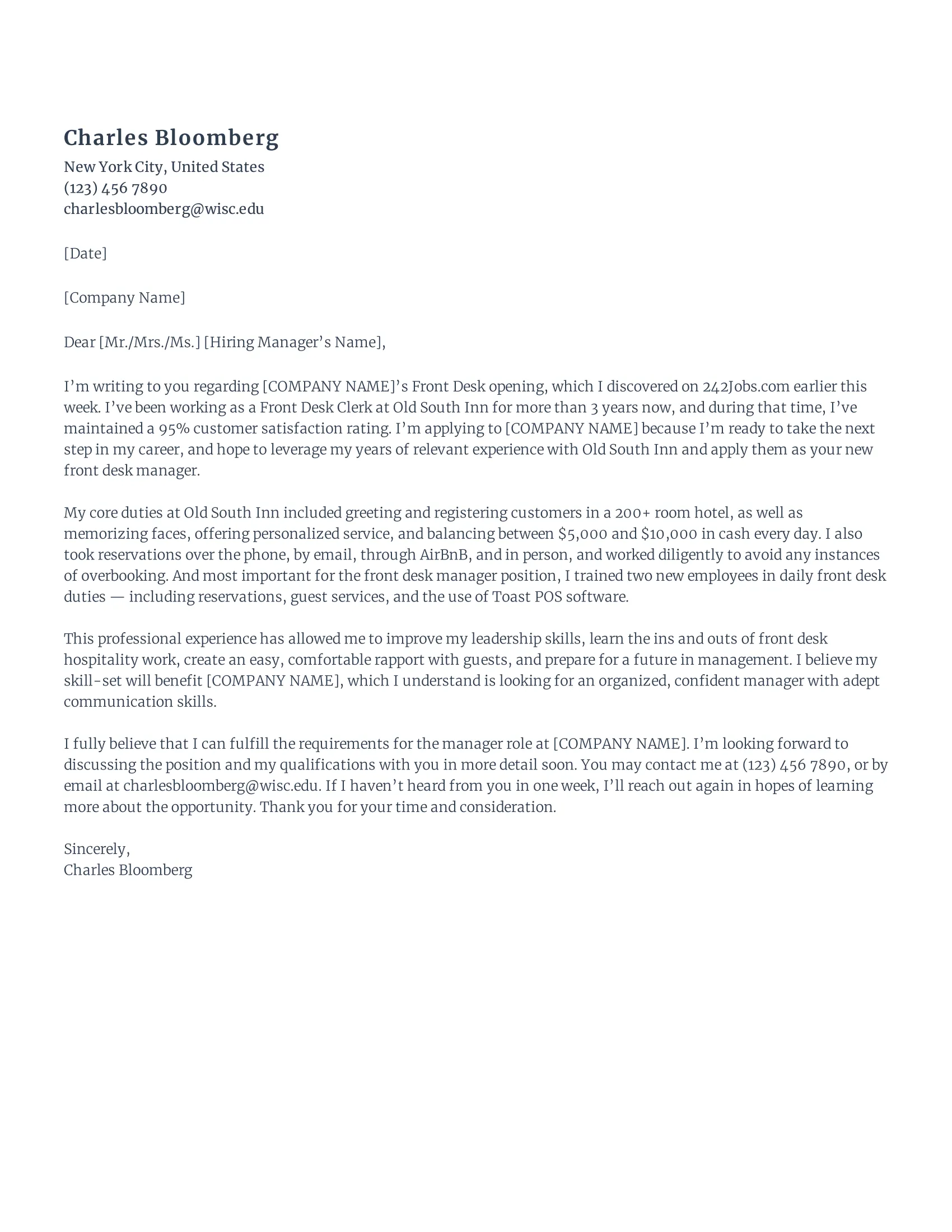
The closing paragraph should reiterate your interest in the position and express your enthusiasm for the opportunity. Summarize your key qualifications and re-emphasize why you are a good fit for the role. Thank the hiring manager for their time and consideration. Include a call to action, such as stating your availability for an interview and providing your contact information. Keep the closing paragraph concise and professional, leaving the hiring manager with a positive impression of your personality and qualifications. Avoid sounding overly eager or desperate, instead, project confidence and express your eagerness to contribute to the company’s success. A strong closing paragraph can significantly influence the hiring manager’s final decision.
Closing and Signature
Conclude your hospitality cover letter with a professional closing and signature. Use a formal closing such as “Sincerely,” “Best regards,” or “Thank you.” Avoid informal closings like “Thanks” or “Cheers.” Leave a few lines blank for your handwritten signature. If submitting your application electronically, you can type your full name after the closing. Ensure your signature is legible and easy to read. This formal approach shows respect for the hiring manager and adds a final touch of professionalism to your cover letter. This final step helps tie all the elements together, making it a complete and compelling document.
Tailoring Your Cover Letter
Customizing your cover letter for each job application is a critical step in the hiring process. Taking the time to tailor your letter will significantly increase your chances of success in the competitive hospitality job market. Generic cover letters that are not personalized tend to get overlooked by hiring managers. Research the company and the specific role thoroughly. Understand the company’s values, mission, and the specific requirements of the job. This knowledge will enable you to write a targeted cover letter that demonstrates your understanding of the company and the position. Highlighting the skills and experiences listed in the job description will show that you are a good fit for the role. Customize your cover letter based on your findings to ensure that your application stands out.
Researching the Company
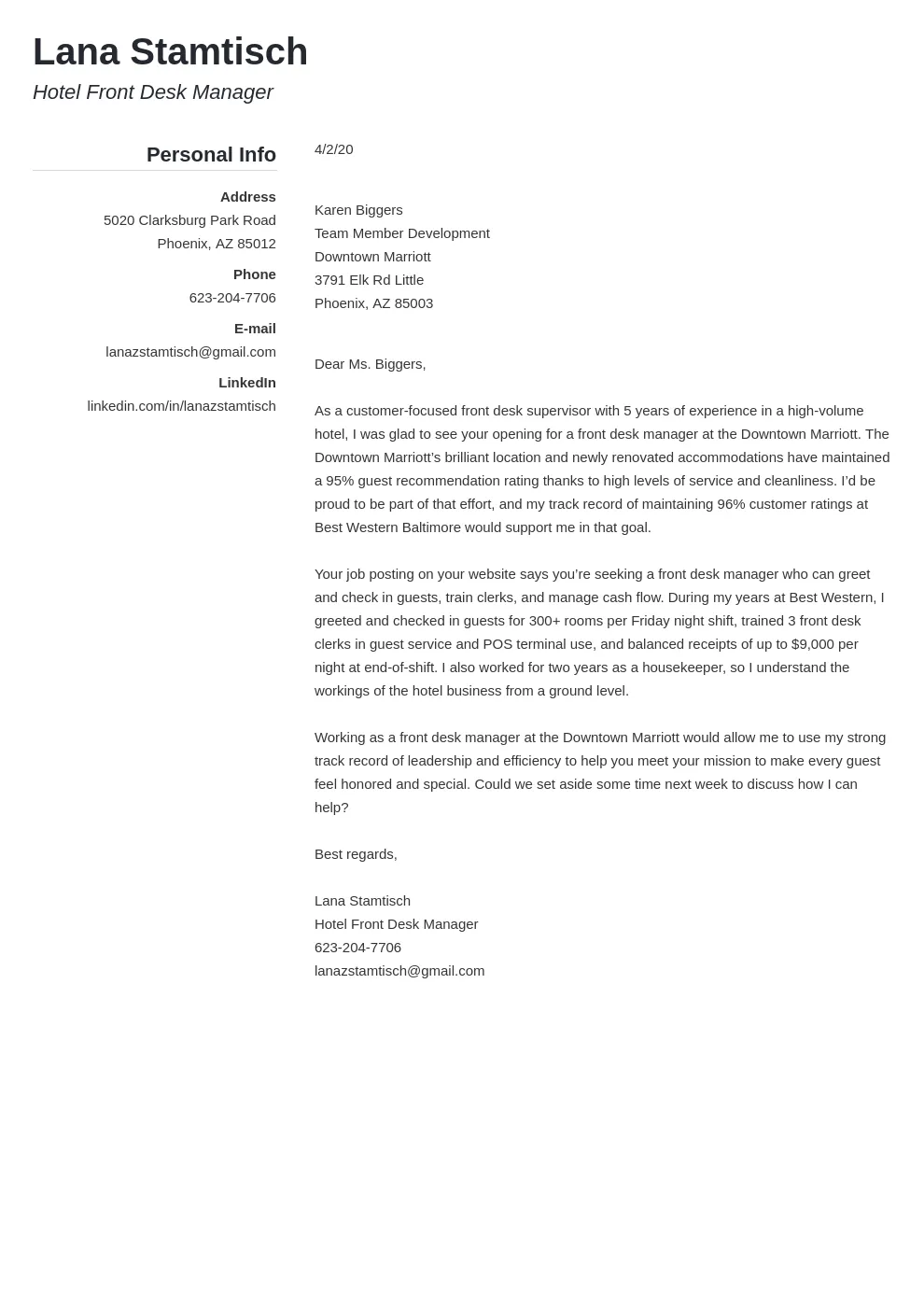
Before writing your hospitality cover letter, conduct thorough research on the company. This will allow you to gain insights into their brand, values, and culture. Visit the company’s website and social media profiles to learn about their services, clientele, and any recent achievements or awards. Look at online reviews and articles to understand what people are saying about the company and the environment in which you could be working. Knowing the company’s mission and values will help you to write a targeted cover letter that demonstrates your understanding of the company and your passion for the role. This approach helps you demonstrate to the hiring manager that you have a genuine interest in the position. When you do your research, be specific and show how your skills and experiences align with the company’s goals and mission.
Matching Skills to Job Requirements
When tailoring your hospitality cover letter, carefully analyze the job description and identify the key skills and qualifications the employer is seeking. Match your skills and experience to these requirements. Highlight examples of your accomplishments that demonstrate your ability to meet these demands. If the job posting mentions customer service skills, provide an example of how you have excelled in this area, whether resolving customer complaints, exceeding their expectations, or handling difficult situations. If the job requires experience with specific software or systems, be sure to mention your proficiency. Tailoring your cover letter to the job description demonstrates your qualifications and shows that you understand the position. It helps the hiring manager see how you can contribute to the company’s success. The closer you match your skills and experiences to the role’s requirements, the greater your chance of success.
Proofreading and Editing Your Letter
Proofreading and editing your hospitality cover letter is essential for making a professional impression. Errors in grammar, spelling, and punctuation can detract from your credibility and make you appear careless. Before submitting your letter, carefully read through it multiple times. Use a spell-checker and grammar-checking tool, but don’t rely on them completely. Sometimes these tools will miss errors that a human eye will catch. Consider having a friend, family member, or career counselor review your letter. Fresh eyes can often identify mistakes you might have missed. Reviewing your letter multiple times will ensure accuracy, clarity, and a polished presentation, which demonstrates your attention to detail and professionalism. A polished cover letter is the final step to making a strong first impression.
Hospitality Cover Letter Examples
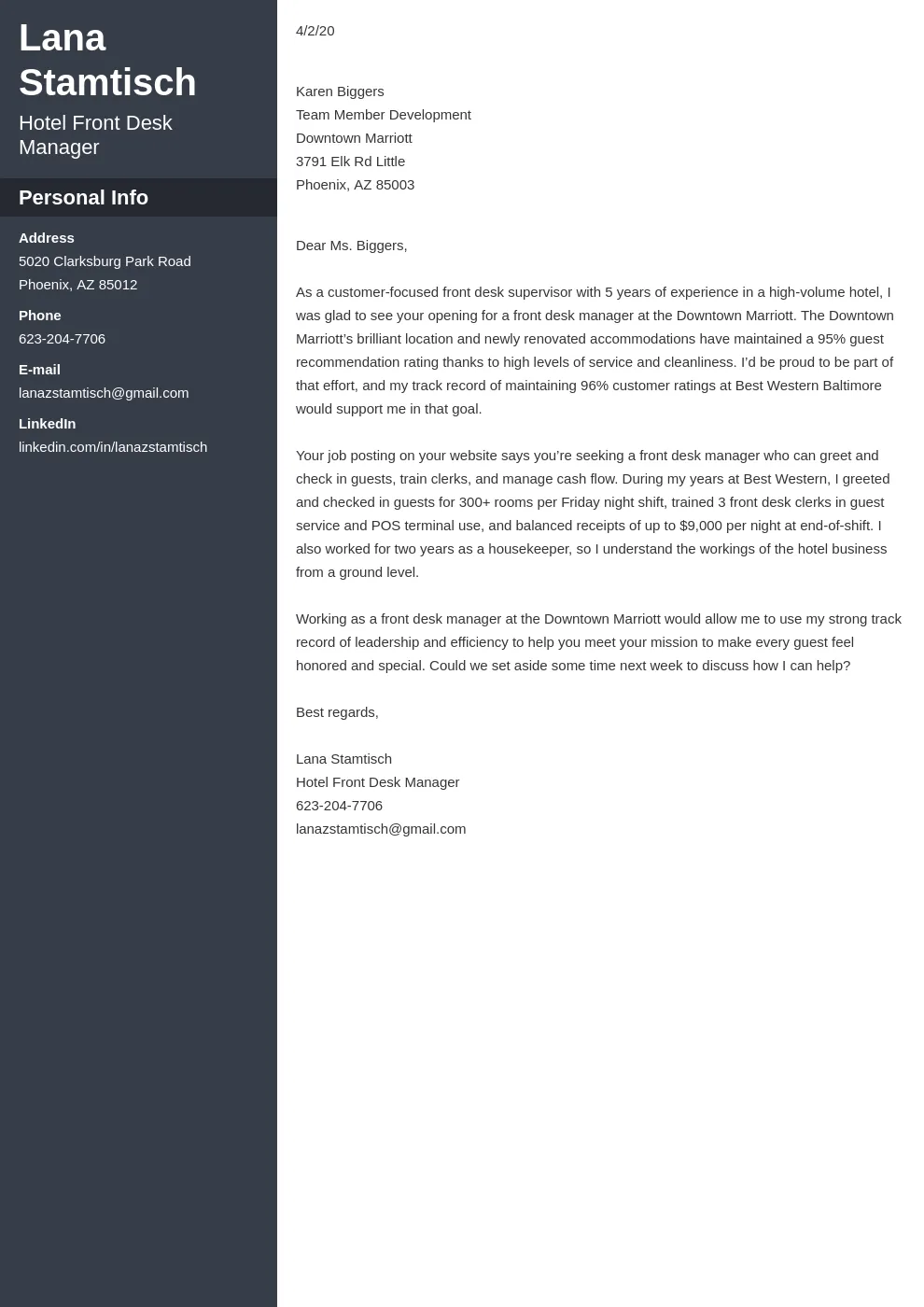
Reviewing hospitality cover letter examples can provide valuable insights into the format and content that are most effective. These examples can help you understand how to structure your letter, showcase your skills and experience, and express your enthusiasm for the job. When reviewing examples, pay attention to how they are formatted. Look at the contact information, the greeting, and the body paragraphs. Pay attention to the language used, and the tone of the writing. Look at the way the applicant conveys their interest in the role and their understanding of the company. It can be helpful to adapt these examples to fit your skills, experience, and the specific job you are applying for. Reviewing different examples gives you a starting point for creating a compelling and personalized cover letter, tailored to your individual strengths and the requirements of each job application.
